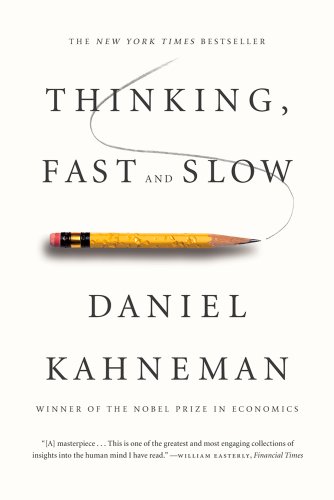
Major New York Times bestsellerWinner of the National Academy of Sciences Best Book Award in 2012Selected by the New York Times Book Review as one of the best books of 2011A Globe and Mail Best Books of the Year 2011 TitleOne of The Economist’s 2011 Books of the Year One of The Wall Street Journal’s Best Nonfiction Books of the Year 20112013 Presidential Medal of Freedom Recipient
In the international bestseller, Thinking, Fast and Slow, Daniel Kahneman, the renowned psychologist and winner of the Nobel Prize in Economics, takes us on a groundbreaking tour of the mind and explains the two systems that drive the way we think. System 1 is fast, intuitive, and emotional; System 2 is slower, more deliberative, and more logical. The impact of overconfidence on corporate strategies, the difficulties of predicting what will make us happy in the future, the profound effect of cognitive biases on everything from playing the stock market to planning our next vacation—each of these can be understood only by knowing how the two systems shape our judgments and decisions.
Engaging the reader in a lively conversation about how we think, Kahneman reveals where we can and cannot trust our intuitions and how we can tap into the benefits of slow thinking. He offers practical and enlightening insights into how choices are made in both our business and our personal lives—and how we can use different techniques to guard against the mental glitches that often get us into trouble. Winner of the National Academy of Sciences Best Book Award and the Los Angeles Times Book Prize and selected by The New York Times Book Review as one of the ten best books of 2011, Thinking, Fast and Slow is destined to be a classic.
Amazon Best Books of the Month, November 2011: Drawing on decades of research in psychology that resulted in a Nobel Prize in Economic Sciences, Daniel Kahneman takes readers on an exploration of what influences thought example by example, sometimes with unlikely word pairs like “vomit and banana.” System 1 and System 2, the fast and slow types of thinking, become characters that illustrate the psychology behind things we think we understand but really don’t, such as intuition. Kahneman’s transparent and careful treatment of his subject has the potential to change how we think, not just about thinking, but about how we live our lives. Thinking, Fast and Slow gives deep–and sometimes frightening–insight about what goes on inside our heads: the psychological basis for reactions, judgments, recognition, choices, conclusions, and much more. –JoVon Sotak

This is how you think Daniel Kahneman may have won his Nobel Prize in Economic Sciences, but his work was psychological in nature as it challenged the rational model of judgment and decision-making. He’s considered one of the most important psychologists alive today, and this book doesn’t disappoint with its breakthrough approach to understanding the “machinery of the mind.”Kahneman introduces two mental systems, one that is fast and the other slow. Together they shape our impressions of the world around…
Buy the real book, not the ebook The kindle version of this excellent book is disappointing. Several features of the book are confusing in the ebook because the formatting is so poor. Tables with two columns run together because they are not boxed and the columns are only separated by one space. There are questions at the end of each chapter whose purpose is unclear until you see them in the real book, where they are set off in a box with a different type face. Most disappointing is the handling of the footnotes – they are…
A brilliant book by a brilliant mind. BE SKEPTICAL ANYWAY. Back in 1994, Massimo Piattelli-Palmarini, Director of the Institute of San Raffaele in Milan, Italy, wrote a charming little book about common cognitive distortions called Inevitable Illusions. It is probably the very first comprehensive summary of behavioral economics intended for general audience. In it, he predicted that the two psychologists behind behavioral economics – Amos Tversky and Daniel Kahneman – would win the Nobel prize. I didn’t disagree with the sentiment, but wondered how in…